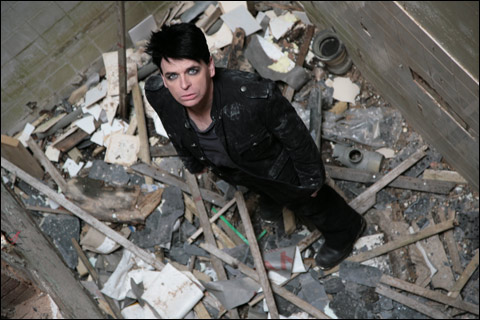
FOR HIS PLEASURE: “There’s a lot of people that talk about early synthesizers as being the Golden Age or whatever,” says Gary Numan, “but I just think that’s bollocks. It was a nightmare.” |
Gary Numan has never been one for nostalgia. Since his icy 1979 high-water mark, The Pleasure Principle (Beggars Banquet), he's put out 16 albums ranging from smoothed-out fretless-bass funk to industrial pop metal. But given the comeback punch that old-school synths have been throwing at every corner of music lately, it seems a ripe moment for Numan to make amends with the old stuff and commit to a late career's worth of well-earned victory laps.
Fans are ready — the 78/79Boxset (Vinyl 180) celebrating his early years just dropped, and he's hitting the road to bash out The PleasurePrinciple and its various B-sides. (He'll be at the Paradise this Friday.) And yet the old new-wave Brit and Tubeway Army founder is cool about the record.
"I wasn't particularly proud of it for years and years and years," he says over the phone from his home in East Sussex. "It was just one of the albums I wrote, not even one I thought was particularly good."
Numan talks as he readies for the first US tour with the old material in decades, a move he seems reluctant to embrace. And to say he's playing down the impact of The Pleasure Principle would be an understatement.
When it first hit, his solo debut helped synths find an everyday place in pop music. Kraftwerk were using them for steely techno metaphor, and Keith Emerson was using them to explore new types of virtuoso wanking, but it wasn't clear how they would fit into regular pop music. Even Devo were mostly a guitar band at that point.
Numan — born Gary Webb — was in the studio for The Pleasure Principle by the time Tubeway Army's "Are 'Friends' Electric?" started climbing the UK charts. He could afford to rent synths for only a few days at a time, during which he would race to arrange songs and record as many tracks as possible. The result was a sparse, focused record built on lonely melodies and economical song structures. There were long instrumentals and vocals in a switchboard-operator cadence that calmly described dystopian paranoia and alienation. The first single, the mechanical gospel "Cars," became a #1 hit, enabling him to leapfrog a line of pre-new-wave artists like Human League who were waiting to break big with underground electro. He also built on the groundwork laid by David Bowie on albums like Low. But it was his stone-simple approach and ideas cribbed from bleak pulp writers like J.G. Ballard and Philip K. Dick that trumped everyone else.
Now, 30 years later, you might well think that his arm's-length distance from the material is due to the dearth of praise for his work since. After getting eviscerated by the British music press early on, he went through several defensive phases. He declared his retirement from touring in 1981, when he was just 23. He became an aerial stunt pilot. He married a member of his fan club. But the guy's been generally skeptical about his work from the beginning. The early move to synths — famously temperamental machines like the Mini-Moog and ARP Odyssey — was accidental.